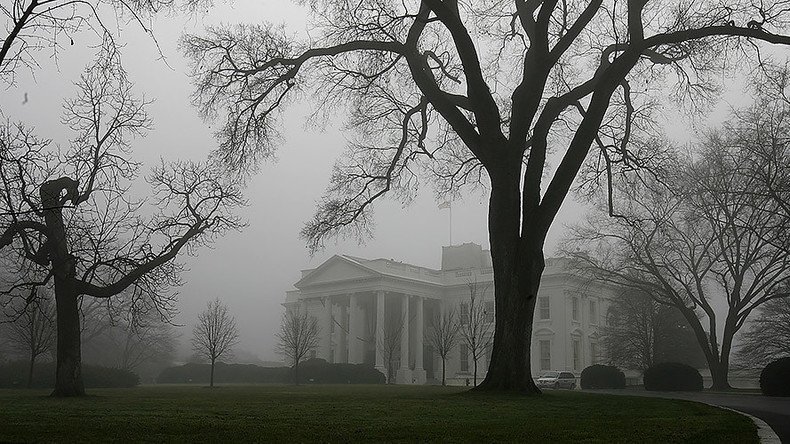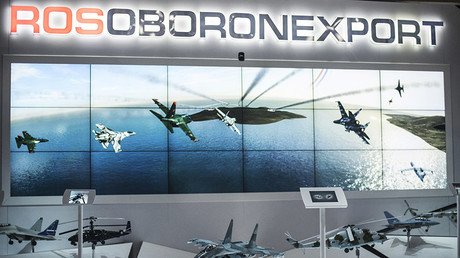New sanctions: ‘Robotic move by US bureaucrats’ or ‘part of anti-Russia propaganda’?

How does the latest US decision to impose sanctions against eight more Russian companies play into the Trump administration’s promise to improve relations with Moscow? RT spoke with experts.
The restrictive measures were introduced against such companies as Russia’s main weapons exporter Rosobornexport and Aviaexport over their alleged violation of US non-proliferation law concerning Iran, North Korea, and Syria.
The restrictions will not cause any serious problems for the country, Russian Foreign Ministry spokeswoman Maria Zakharova said.
“This step runs counter to the statements we hear from Washington that emphasize the fight against terrorism, in particular in Syria, where it has gained a foothold,” she said in a statement.
But how much political damage to Moscow-Washington relations could this move cause?
According to Paul Craig Roberts, former Assistant Secretary of the Treasury, “it’s part of the propaganda to paint a negative picture of Russia, and also China because they are included in the sanctions.”
In his view, it’s not likely that ties between Russia and the US will improve, and here’s why:
“What’s going on in the US, the battle between President Trump and the military-security complex, is over the budget. The military-security complex’s budget is massive; it’s about 1,000 billion dollars annually. That type of budget requires an enemy and Russia was made that enemy. When Trump said he would normalize relations, then the enemy disappears. So the CIA, the Pentagon, the military in general very much oppose these normalized relations. They have chosen a way to block them – that is the demonization of Russia and its president, but also accusations that Trump owes his election to his collusion with Putin and hacking the election. That type of charge makes it difficult for Trump to normalize relations with Russia, because if he does, it’s taken as confirmation that he is a ‘Russian agent’ or ‘Putin’s stooge.’”
In Roberts’ opinion, Russians shouldn’t to “pay too much attention to these sanctions.”
“Russia should focus on its relationships with the East – China, India, Silk Road, Eurasian trade arrangements – and go about this business and stop being so sensitive to Western approval. Why does Western approval matter anyhow? You’re talking about a decadent civilization that has bombed nine countries in the last 15 years. What kind of approval can that be? What does it mean to anyone?” Roberts told RT.
Jim Jatras, former US diplomat, is more optimistic on the prospect of Russian-US rapprochement.
He agrees that the decision to impose new sanctions contradicts Trump’s promise to restore relations with Moscow. However, he told RT, the decisions are still made largely by bureaucrats from the old administration, as Trump’s new team “is barely in place,” with even the deputy secretary of state still missing.
“It just shows the extent to which US policy in so many respects is highly bureaucratic, very much autopilot, that these steps are taken because, yes, periodically we must review, and if the criteria are met we’ll apply new sanctions according to the laws that are on the books. It’s almost automatic, it’s almost robotic in many respects. It would take strong action and determination from the incoming Trump team which [is] barely in place... 97 percent of the administration is still made up of either bureaucrats or the Obama horde, which is just busily doing what they have been doing until at some point someone tells them to stop doing it. We are not there yet,” Jatras said.
He said he hopes that the sanctions won’t make “too much” political damage, and that “the Russians are mature enough to see this as what it is – bureaucrats doing what they do.”
The former US diplomat added that it’s going to take some time for President Trump to get a hold of his administration and actually start making a shift in policy.
Private investor and political analyst Charles Orton noted that at the end of Barack Obama’s term, Russia “showed great restraint” and did not retaliate against the decisions of the outgoing administration.
“There is hope I think at both sides of the ocean, good thinking people in American and in Russia, to do what is possible to get to a new level in relationships between our two great countries. So it’s a bit perplexing to see this move happen now,” he told RT.
The statements, views and opinions expressed in this column are solely those of the author and do not necessarily represent those of RT.













